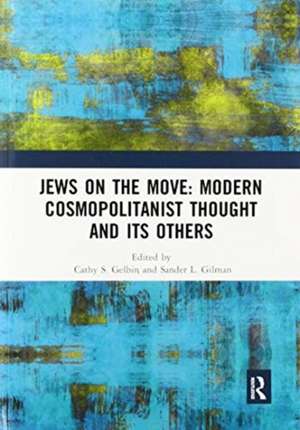Jews on the Move: Modern Cosmopolitanist Thought and its Others
Editat de Cathy Gelbin, Sander L Gilmanen Limba Engleză Paperback – 31 iul 2020
In a post-Zionist world, where one of the newest and most substantial Diaspora communities is that of Israelis, in the new globalized culture, is “being Jewish” suddenly something that can reach beyond the older models of Diasporic integration or nationalism? Which new paradigms of Jewish self-location, within the evolving and conflicting global discourses, about the nation, race, Genocides, anti-Semitism, colonialism and postcolonialism, gender and sexual identities does the globalization of Jewish cultures open up? To what extent might transnational notions of Jewishness, such as European-Jewish identity, create new discursive margins and centers? Is there a possibility that a “virtual makom (Jewish space)” might constitute itself? Recent studies on cosmopolitanism cite the Jewish experience as a key to the very notion of the movement of people for good or for ill as well as for the resurgence of modern nationalism. These theories reflect newer models of postcolonialism and transnationalism in regard to global Jewish cultures.
The present volume spans the widest reading of Jewish cosmopolitisms to study “Jews on the move.”
This book was originally published as a special issue of the European Review of History.
Preț: 259.31 lei
Preț vechi: 311.06 lei
-17% Nou
Puncte Express: 389
Preț estimativ în valută:
49.63€ • 51.42$ • 41.42£
49.63€ • 51.42$ • 41.42£
Carte tipărită la comandă
Livrare economică 21 martie-04 aprilie
Preluare comenzi: 021 569.72.76
Specificații
ISBN-13: 9780367529758
ISBN-10: 0367529750
Pagini: 226
Dimensiuni: 174 x 246 mm
Greutate: 0.42 kg
Ediția:1
Editura: Taylor & Francis
Colecția Routledge
Locul publicării:Oxford, United Kingdom
ISBN-10: 0367529750
Pagini: 226
Dimensiuni: 174 x 246 mm
Greutate: 0.42 kg
Ediția:1
Editura: Taylor & Francis
Colecția Routledge
Locul publicării:Oxford, United Kingdom
Public țintă
Postgraduate and UndergraduateCuprins
Part I. Jews in modern cosmopolitanist thought 1. Cosmopolitanism and the critique of antisemitism: two faces of universality 2. Aliens vs. predators: cosmopolitan Jews vs. Jewish nomads Part II. Jews and cosmopolitanism in interwar Germany 3. Revolutions, wars and the Jewish and Christian contribution to redemptive cosmopolitanism in Franz Rosenzweig and Eugen Rosenstock-Huessy 4. Hotel patriots or permanent strangers? Joseph Roth and the Jews of inter-war Central Europe Part III. Jews, cosmopolitanism and political thought 5. Marxism, cosmopolitanism and ‘the’ Jews 6. New futures, new pasts: Horace M. Kallen and the contribution of Jewishness to the future 7. Rootless cosmopolitans: German-Jewish writers confront the Stalinist and National Socialist atrocities Part IV. Jews and the new cosmopolitanism 8. Inviting essential outsiders in: imagining a cosmopolitan nation 9. ‘Cosmopolitan from above’: a Jewish experience in Hong Kong 10. The possibilities and pitfalls of a Jewish cosmopolitanism: reading Natan Sznaider through Russian-Jewish writer Olga Grjasnowa’s German-language novel Der Russe ist einer, der Birken liebt (All Russians Love Birch Trees) 11. Cosmopolitan Europeans? Jewish public intellectuals in Germany and Austria and the idea of ‘Europe’ 12. Drifting towards Cosmopolis 13. Maximalism as a Cosmopolitan strategy in the art of Ruth Novaczek and Doug Fishbone
Descriere
Are Jews a global people or are they a national people defined by a specific national state? How has the role of Jews across today’s global culture been shaped by history and geography? This collection was originally published as a special issue of European Review of History.
